You would likely be hard pressed to find a fly fisherman that doesn't have an inbuilt tendency to go long. We buy rods that cast further, lines that shoot longer and so on. For the most part, it's easy to see why. For many first time fly casters, casting even 20 feet of line can seem like an insurmountable hurdle. As we begin to get a feel for it, casting a bit further and controlling more line becomes a bit easier. As our control increases even more, casting longer and longer lines becomes a far simpler task. Control, we all quickly learn, is paramount to fishing success. And so we begin to equate our ability to be in control when fishing with our the ability to cast more line.
Plus, it's fun. Watching a well-formed loop unroll on a 50 foot cast is a thing of beauty, and one that any angler can take pride in having created, even if it lasts only for a fraction of a second. The reality, however, is that short casts catch more fish.
Most certainly there are situations when tossing a long cast is a must, but these situations are the exception rather than the rule. Short casts are the norm, at least they should be, and the anglers on the stream that aren't throwing line farther than they need to are often the ones catching the most fish. And there are many good reasons why.
Short Casts Drag Less
This is the big one. Following the basics of casting, the concept of drag and how to avoid it are the first things beginner anglers are taught, and with good reason. Whether fishing dries, nymphs or even streamers, the ability to understand and control drag plays a primary role in determining whether or not an angler meets success on the stream.
The relationship between cast length and drag is a simple one. Short casts drag less, without exception. More line off the tip of your rod means more line on the water which equates to more drag. The reasons for this are numerous. First and foremost amongst them are the basic laws of geometry, but of no small concern are contributing factors such as cross currents, micro currents, the influence of wind, ability to mend and otherwise control your fly line and so forth. Whatever the cause, the more line you throw, the quicker drag will set and and the more difficult it will be for you to prevent it from doing so.
The reason that the world's best nymph fishermen operate with no fly line whatsoever on the water -- otherwise known as tight-line nymphing -- is that they know less line means more control. An angler in control is able to maximize his or her chances of catching fish. An angler that lacks control is simply leaving things to chance.
Short Casts Set Hooks Better
An angler in control of his fly line doesn't just have a greater chance of managing drag, he also has better control all other aspects of his fly fishing. One of those other aspects, the ability to set the hook, is of no small importance to the angler that hopes to catch fish. Setting the hook at 35 feet is relatively easy. Driving it home at 25 feet is even easier. But what about 60 feet? Or 70? Certainly it can be done. I've even hooked fish at 90 feet, but doing so is difficult and misses come far more often than hits.
The relationship between cast length and hook setting, all other factors equal, is comparatively similar to that of cast length and drag. The longer the line, the harder it will be to set the hook. Physics is the driving force here -- transmitting energy from point A (the anglers hand or fly rod) to point B (the hook) and an angler's ability to do so, and do so quickly, is complicated by the amount of line (read: slack) she has to manage.
Short Casts are More Accurate
I've yet to meet the angler that has better aim at 65 feet than he does at 35 and I don't expect we'll cross paths any time soon. Nor have I ever met the angler that catches more fish with sloppier casts.
Whether targeting a single rising fish, trying to swing a streamer past a logjam, or drift a nymph past a big boulder in a fishy-looking riffle -- a more accurate cast is the key to doing so and shorter casts are invariably more accurate than longer ones.
Once again, this is all about control, and shorter lines mean more control.
Short Casts Fish the Near Water
This is more a consequence of making shorter casts rather than a direct benefit of doing so, but can often be no less important. One of the most cardinal sins of the angler that aches to throw a long line is fishing over, or worse -- standing in, the water they should be fishing. We've talked about this time and time again in other articles, but it bears repeating from another perspective: always fish the near water.
If you don't believe that the water near the shore holds fish and should be targeted, cough up $500 for a float trip on a nearby river. Chances are, you'll spend the vast majority of your day pounding the banks. The reason? Your guide knows where the fish are and wants to help you catch them, and those fish are holding near the banks.
Highly effective anglers always fish the near water. And short casts, by virtue of their lack of distance, do just that.
Short Casts Make You a Better Angler
Long casts make you a better caster, but not necessarily a better angler. Without question, the angler with both long and short casts in her wheelhouse will be a more well rounded angler, but simply being able to throw a long line in the yard outside the local fly shop doesn't translate into better fish catching chances.
An angler that expects to be working water relatively nearby will be concerned with all manner of significantly important topics, all of which revolve around what he can see and what the fish he is targeting can see. An angler working nearby water can see and read that water better, spotting likely fish-holding lies. Sometimes he can see his quarry, and adjust his approach accordingly. Additionally, he is aware that without proper care, his quarry will likely see him. He takes time to learn what he can about the fish's window -- what a fish can and can't see -- and approaches the water with all manner of manageable stealth.
The angler that defaults to fishing the water that's 50 feet out? He likely doesn't care much about those things. But he sure can cast far.
Go Long When Only Needed
Every angler should spend time practicing his or her casting, both near and far. The more extensive an angler's toolset, the greater his or her chance for success. But going long should be reserved for situations when more practical alternatives don't exist: fish that are holding in positions that can't be approached more closely with adequate stealth, fish holding deep that require a lengthy sunken line to reach and so on.
Going long invariably means giving up some measure of control, often a significant measure, and control is something no angler should be willing to relinquish easily.







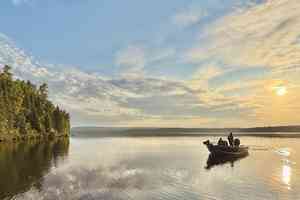



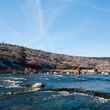
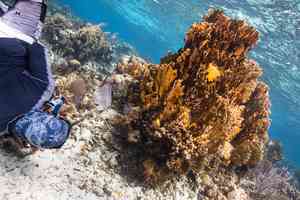






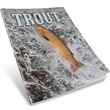

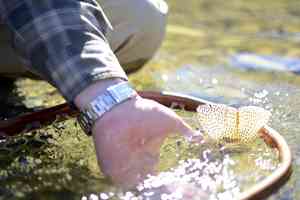
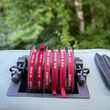



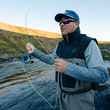

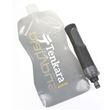
Comments
Rob Mellors replied on Permalink
Great summary of the benefits of short line casting. However, given two anglers with the same skill, knowledge and observational levels the one that can cast further is better placed in the overall game. Admittedly, no rocket science there!
Except to say one observation of people who can cast further, they have to resist the temptation to cast to the horizon when starting a day particularly on a lake. Work the margins to start with, unless of course there's something rising or moving in the distance!
Eric Gates replied on Permalink
Lines that "cast father." I see what you did there.
Chad Shmukler replied on Permalink
For better or worse, Eric, that was just a typo. :)
Eric Gates replied on Permalink
Was :)
Jim replied on Permalink
Farther or Further? Farther is used in relation to physical distance; it means "at or to a greater distance" whereas "further" means "to a greater degree". An easy way to remember is to use the mnemonic "In a galaxy far, farther away..", which will remind you to use farther only in the context of distance.
Robbins Church replied on Permalink
As per Jamal Wallace in "Finding Forrester."
Walter replied on Permalink
I agree with the premise but as stated.......most fly fishermen that can haul long casts accurately can also make shorter casts easily - but not vice versa. I spend a lot of time lawn casting when not on the stream .....and as lefty Kreh I believe once said......being able to make long casts is not a disadvantage in fly fishing.
Mark replied on Permalink
This is the great advantage of Tenkara style fishing. You mostly fish the near water as well as the little waters.
Captain David Dietrich replied on Permalink
Short casts catch MAY result in more fish for a poor angler but encouraging that angler to fish short only helps him for a day. It doesn’t help him be a better angler. Just returned from the Missouri below Holter. Most people fish sitting down per guide instructions. I stood tall on the bow of the drift boat, fishing 30+ feet from the boat all day and caught fish on damn near every cast. Get better. Stop settling for what U can do today. Also be a better guide and stop thinking about the day. Think about a lifetime customer. Work hard on their craft and they will fish and trust you more. Speaking from experience. Never settle.
Mike Lundrigan replied on Permalink
I never walk close to the water I intend to fish at the start. I creep slowly within a short cast …(about 20 feet) and gently land my fly a few feet off the bank, total cast perhaps 25 feet max. I have caught many nice trout this way that were just off the bank that I would have otherwise scared and as they swam away would have warned other fish further out to be wary! I have found this gives me much more success and larger fish too!
Mark Hayes replied on Permalink
In my opinion, your article best addresses a scenario where you are casting to a single fish. Everyone knows that they improve their odds by getting to their optimal casting distance, taking into account, accuracy, form, ability to make a delicate presentation, etc. Mine is 25' distance total with a 9' leader. Ideally, I'm standing in a river with 5-20 fish rising to either side or above me, at various distances. In this scenario, you find the optimal position and take shots at the closest fish first, working your way out. For me personally, I won't cast to a fish over 45' out, for all the reasons you mentioned in your article, unless I have no other option. Water depth or speed can influence how close you get. I wait until I've worked the closer fish and then move closer to the fish that is further away. In any case, I think this is a convincing article and it really got me thinking. thanks!
Pages